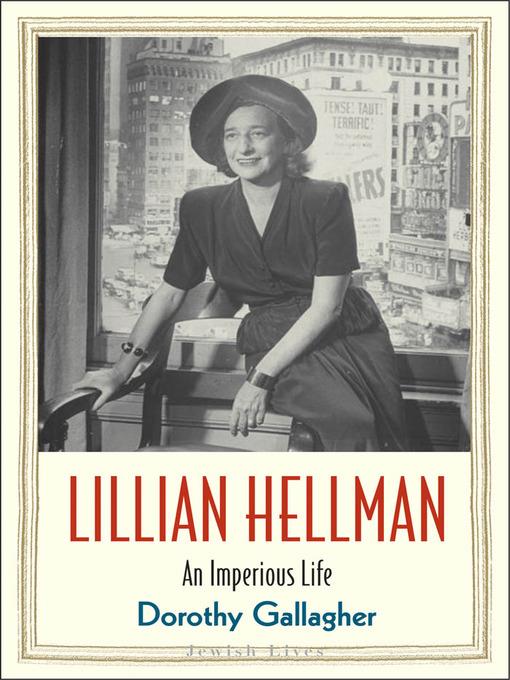
Lillian Hellman
An Imperious Life
- اطلاعات
- نقد و بررسی
- دیدگاه کاربران
نقد و بررسی

November 25, 2013
Unafraid to question Hellman’s idealized memoirs, Gallagher (Hannah’s Daughters) meets the “unflaggingly famous” dramatist head on in this pithy biography. Gallagher scrutinizes the “only woman playwright of her generation” from multiple angles, but only converges on the sharp projections and recesses in Hellman’s haughty character that interest her most: Hellman’s Bavarian great-grandfather Isaac Marx, who immigrated to antebellum Alabama; her analyst Dr. Gregory Zilboorg; the writer’s defiance before the House Committee on Un-American Activities; and her spiteful lawsuit against Mary McCarthy. The portrait that develops, from Hellman’s failed early marriage, endless sexual escapades, and longtime love affair with writer Dashiell Hammett is not altogether surprising: her poor relatives embarrassed her; money attracted her but she expressed contempt for the rich; she based the Hubbards in Little Foxes overtly on her family; she lied in her memoirs. If Gallagher places an undue focus on Hellman’s “lack of beauty” but “very active sexual life,” she also struggles to maintain a line of critical distance from Hellman that reveals the author’s investment in the “dogmatic, irritable, mean, jealous, self-righteous, angry” subject, a dance that mirrors Hellman’s own two-step with fact and truth.

December 15, 2013
In her own memoirs, How I Came into My Inheritance (2001), Gallagher has shown herself to be an incisive, sharp-edged, darkly humorous writer, and these qualities help engage readers in a study of Lillian Hellman (1905-1984) that might otherwise seem mean-spirited. The author has no personal ax to grind against her subject, as do many of the sources she quotes, but her portrait is all the more devastating since it seems so matter-of-fact. The best she can say about Hellman is that she was "a conundrum--a person whose determination to prevail in all aspects of her life was often at odds with the persona of moral rectitude she presented to the world." Her longest success, as a playwright, started with her relationship with Dashiell Hammett and ended with him, leading Gallagher to suggest that on her own, Hellman would not have amounted to nearly as much. Her memoirs, which gave her a literary resurgence, are dissected for untruths and half-truths, usually self-serving. She was an unapologetic Stalinist (as was her lover Hammett) who was either ignorant or uncaring about the realities of the brutal dictator's rule. "What seems most peculiar in Hellman's casual misuse of factual truth is her comfort with what might be easily shown to be untrue," writes Gallagher, using the memory Hellman spun into the highly acclaimed movie Julia (1977) as an example. Gallagher comes closest to admiration in her accounts of Hellman's promiscuity, which reportedly resulted in at least seven abortions. "She was never very pretty," writes the author, "and there is no doubt that all her life she suffered from a lack of beauty, although it never seemed to impede her very active sexual life." Or: "Few beautiful women could equal Hellman's sexual success; few had her boldness, her presence, her nerve." Less a conventional biography than a critical appraisal of the subject's character, career and contradictions--not likely to add any luster to Hellman's tarnished reputation.
COPYRIGHT(2013) Kirkus Reviews, ALL RIGHTS RESERVED.

March 1, 2014
Selectively culling from extensive secondary sources for details of personal, social, political, and literary elements in Lillian Hellman's life, Gallagher (Hannah's Daughters; All the Right Enemies) emphasizes less admirable aspects of her subject, shading this little biography on the dark side, as Hellman's excessive drinking, angry and duplicitous actions, and "frenetic sexual activity" end in mental and physical deterioration. The author seems to think that Hellman's family origins in the American South in the 1840s disadvantage her by making her unable to identify with the later immigrant Jewish experience. She finds Hellman's dramas The Little Foxes and Another Part of the Forest to be autobiographical revelations of her strong ambivalence about money: desiring it herself, despising its power in others. Hellman's testimony at the McCarthy hearings is presented as more self-preserving than principled. Her longtime significant other Dashiell Hammett gets credit for her crafting of The Children's Hour. Hellman's advice on the scripting of the play The Diary of Anne Frank is credited with creating its universality but changing its meaning, thereby spoiling its Jewishness. VERDICT For fuller, more balanced, and better organized information on this important subject, read instead Deborah Martinson's Lillian Hellman: A Life with Foxes.--Ann Fey, SUNY Rockland Community Coll., Suffern
Copyright 2014 Library Journal, LLC Used with permission.

January 1, 2014
Enough comprehensive biographies of playwright and memoirist Lillian Hellman (190584) already exist to leave scintillating writer and memoirist Gallagher (Strangers in the House, 2006) free to concentrate on the aspects of Hellman's life that most intrigue her, beginning with her maternal great-grandfather, Isaac Marx. A scrappy German immigrant, he became the first Jew to settle in Demopolis, Alabama, in 1840, where he set up a general store and thrived. On to Hellman herself. Gallagher forthrightly considers the curious connection between Hellman's famously unfettered sexuality and stark lack of beauty (though her figure was alluring, and her style elegant) and analyzes at length her painful relationship with her true love, noir writer Dashiell Hammett. At the peak of his fame, he helped Hellman become an acclaimed playwright (The Children's Hour, The Little Foxes), only to lose his own writerly prowess. Gallagher pounces on and decisively dissects the choicest bits in Hellman's colorful and contrary life of artistic excellence and blinkered radicalism, self-mythologizing and egregious lies, creating a fast-flowing, deeply provocative portrait of a seductive, truculent, and audacious literary powerhouse.(Reprinted with permission of Booklist, copyright 2014, American Library Association.)




دیدگاه کاربران